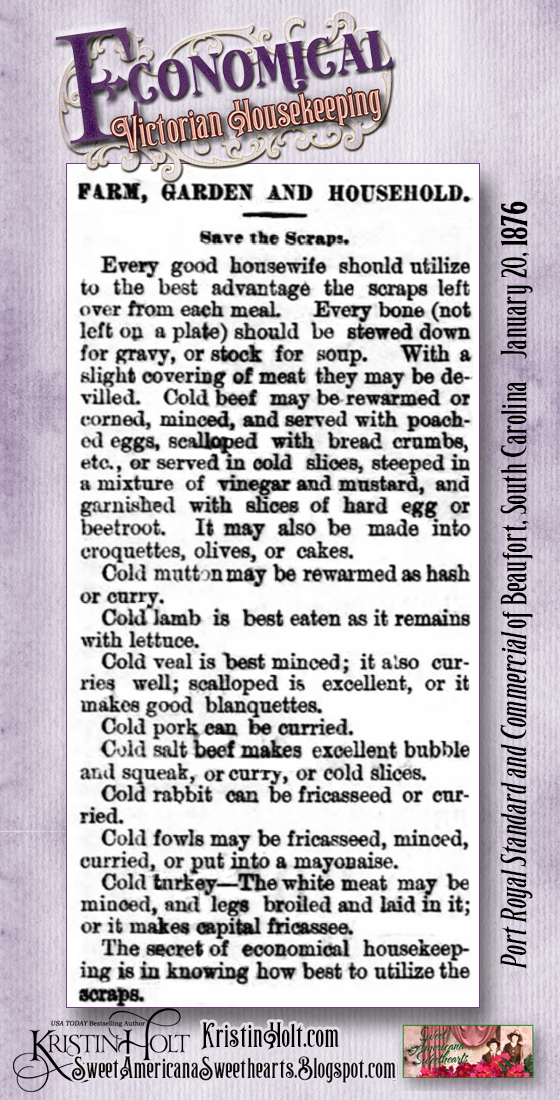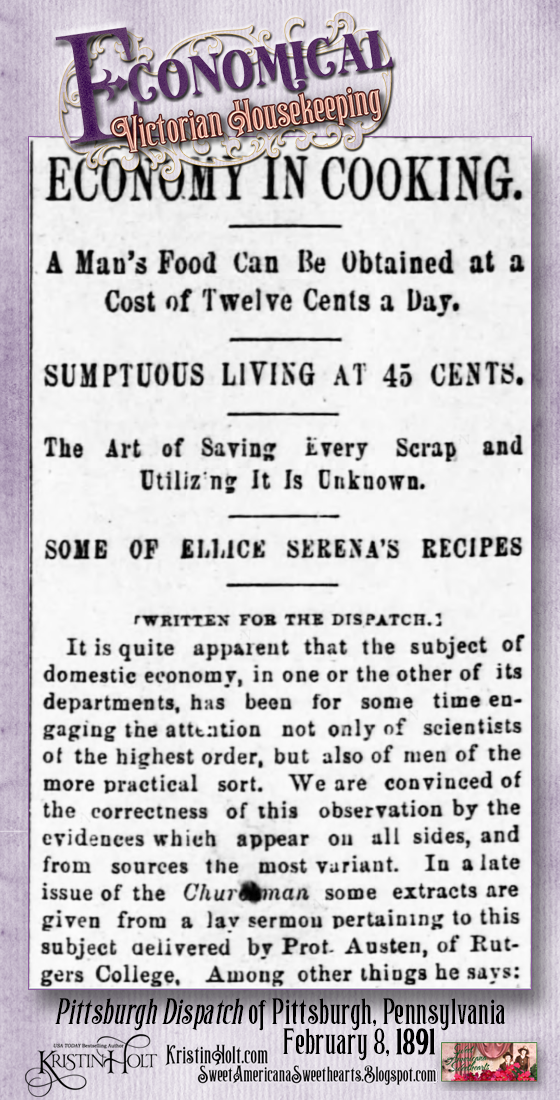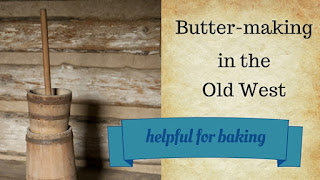by Kristin Holt, USA Today Bestselling Author
of Sweet Romance set in the Victorian-era American West
Victorian Woman's Sphere
During the nineteenth century, the United States held specific ideas about what constituted a "Woman's Sphere." Home was her domain, her responsibility, and her realm of influence. Because society held these home-centered ideals, girls were trained from an early age to fulfill this role. Not only did girls work alongside their mothers to learn every housekeeping nuance, but Victorian media (newspapers, cook books, books of housekeeping wisdom) emphasized a wide spectrum of housekeeping knowledge and importance. Book publishers and institutions (such as the Boston Cooking School) capitalized on filling the gap between home-instruction and this most highly valued profession: wife and mother.
Housekeeping: More than Housework
Housekeeping included far more than scrubbing floors, cleaning the wallpaper, and laundering clothes and linens. Women were charged with creating the best possible living from allotted household funds. Household spending covered everything from heating and cooking fuel to groceries to clothing.
There are women to whom small economies, little improved ways of caring for things, never occur, but who gladly avail themselves of any knowledge they might gain. Such a woman will rejoice to know that her carpet sweeper will last much longer and will work more satisfactorily if the wheels are oiled occasionally ; that her wringer, if the screws are loosened when it is put away, will also take on a new lease of life ; that in the course of a year she may save several dollars if she drives a nail on which the stove hook may hang, and see that it is hung there, and is not left on the stove, where the handle is sure to burn and drop off.
~ The Burlington Free Press of Burlington, Vermont. September 12, 1881.
Economy in Victorian Housekeeping
Women's work was nothing if not repetitious and sometimes backbreaking. Note that the following article, "Young Housekeepers Should Always Follow These Rules," includes a "regular day for washing and one for ironing." Last among this list of Rules: "Allow no waste of any sort."
Economy in the Victorian Kitchen
In an era of rampant dyspepsia, housekeepers were indoctrinated in the importance of sanitary and healthful cookery. Women learned kitchen science from their mothers, schools, and cookbooks. They also learned the essential Victorian value: waste not, want not. "If you do not waste anything, you will always have enough. ~source"
Note the high attitude in the following 1879 article. If a wasteful American housekeeper didn't realize her follies before, this set-down would bring all sorts of crimes to her attention.
WASTE IN HOUSE KEEPING.
Americans are an industrious, money making people, but they are not economical. Our housekeeping is proverbially wasteful, allowing leakage at every point, sufficient in the aggregate, in many households, to support a European family. Some writer (we know not to whom to give credit,) has made the following extensive, but by no means complete enumeration :
Much waste is allowed in cooking meats. Unless watched, thee cook will throw out water in which meat has been boiled, without letting it cool to take off the fat; or she will empty the dripping-pan into the swill-pail. The grease is useful in many ways.
Again, bits of meat are thrown out, which a French cook would convert into excellent hash.
Flour is sifted in a wasteful manner, or the bread-pan is left with the dough sticking to it.
Pie-crust is left over, and laid by to sour, instead of making a few tarts for tea.
Vegetables are thrown away which would be nice if warmed over for breakfast.
Cream is allowed to mould [sic] and spoil, mustard to dry in the pot, and vinegar to corrode the castor.
Good knives are used for cooking in the kitchen, silver spoons are used to scrape kettles, and forks for toasting bread.
Tea, roasted coffee, pepper and spices, are allowed to stand open and lose their strength.
Dried fruits not cared for in season become wormy, and sweet meats are opened and forgotten.
Vinegar is drawn in a basin, and permitted to stand until both strength and basin are spoiled.
Soap is left in water to dissolve, or more used than is necessary, and the scrub-brush is left in the water.
Barrels and tubs are left in the sun to dry and fall apart ; tins put away without being properly dried are rusted.
Molasses stands open and flies take possession.
Pork spoils for want of salt, and beef because the brine wants scalding.
Ashes are thrown out carelessly, endangering the premises, and being wasted.
Clothes are being whipped to pieces by the wind on the lines ; fine cambrics [sic] are rubbed on the wash-board ; and laces are torn in starching.
Table linen is thrown carelessly down and nibbled by mice ; is put away damp and mildews ; or the fruit stains are forgotten and the stains washed in or "set."
Table napkins are used to wipe dishes, and tea-pots are melted on the stove.
Lard is not well dried out, and becomes tainted, and rats destroy the "soap grease."
Bones are burned that might be broken and thrown into the compost heap.
Old shoes, woollen [sic] rags, and such accumulations are permitted to lie round loose instead of being composted for your favorite grape vines.
Sugar is spilled around the barrel, coffee from the sack, and tea from the chest.
Wooden boxes are used to take up ashes, then the box is pushed aside and forgotten. Many a family has been houseless [sic] and homeless in a night by such an inadvertance [sic].
Each of the above items is a trifle in itself--and yet the house where all these trifles are "happening"--just imagine what a place it would be! In these and many other ways a careless and inexperienced housekeeper will waste without heeding--nay, even without even knowing that she wastes. On the contrary, because she entertains but little company, buys no fine clothes, makes her own dresses, and cooks plainly, she may imagine that she is an exceedingly economical woman and a very excellent housekeeper.
~ Yorkville Enquirer of York, South Carolina, May 1, 1879
Despite the criticisms herein heaped upon the heads of wasteful housekeepers, many vintage sources support the idea that many women were excellent housekeepers--with surprising economy.
The next article (1891) focuses on economy in cooking, sharing not only affordable recipes for "plain cooking" but also the strategy of "saving every scrap (of food) and utilizing it." In the Victorian-era United States, "cheap" meant affordable and economical.
As a frame of reference, note that the "a man's food can be obtained at the cost of twelve cents a day" approximation, adjusted for inflation, is $4 (in 2020). Sumptuous living at 45 cents (1891) is about $13 (in 2020).
Wow... do you eat sumptuously on thirteen dollars a day?
Quality advice, isn't it? Even for modern times?
Invitation
What do you think?
Is it possible to eat sumptuously on $13 daily, in today's world?
Did you garner useful concepts to put to work in today's kitchen?
Please scroll down and comment. Discussion is the best part!
Related Articles
Copyright © 2021 Kristin Holt LC























No comments:
Post a Comment